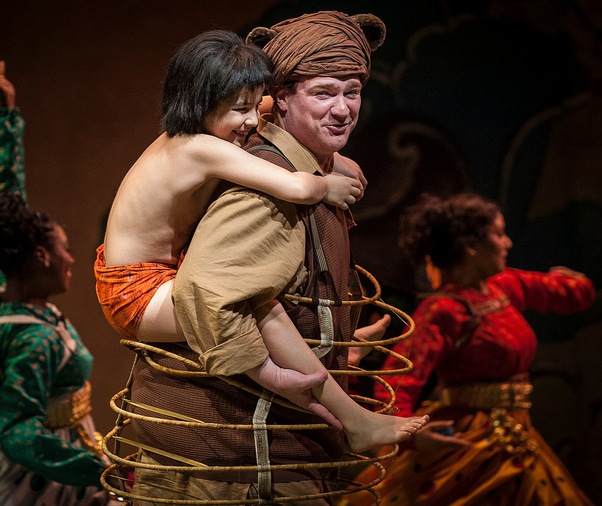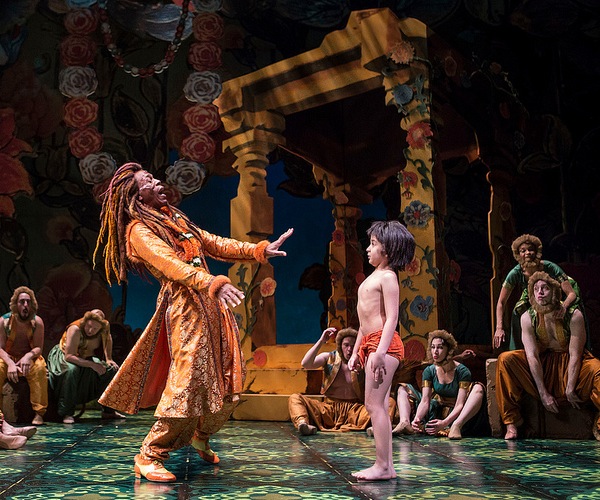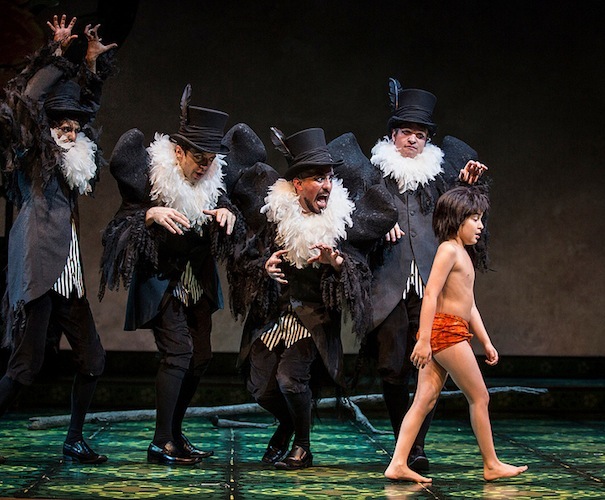Theater Review: “The Jungle Book” — A Satisfying Entertainment
Mary Zimmerman’s Jungle Book may not have the same kind of compelling narrative and emotional depth as her Bernstein/Voltaire tour de force, but there’s plenty of magic in this Disney/Kipling mash-up.
The Jungle Book. Original music and lyrics by Richard M. Sherman and Robert B. Sherman; additional music and lyrics by Lorraine Feather and Paul Grabowsky, Terry Gilkyson, and Richard M. Sherman. Book and direction by Mary Zimmerman. Music orchestration, supervision, adaptation, and arrangement by Doug Peck. Choreography by Christopher Gattelli. Produced by the Huntington Theatre, in association with Goodman Theatre, at the BU Theatre, 264 Huntington Ave., Boston, MA, through October 20.

Akash Chopra (Mowgli) and Kevin Carolan (Baloo) in Tony Award winner Mary Zimmerman’s new musical adaption of THE JUNGLE BOOK;. Photo: Liz Lauren.
By Evelyn Rosenthal
After refreshing my memory with a viewing of Disney’s 1967 animated feature and a rereading of the 1894 Rudyard Kipling book, I was eager to see what Mary Zimmerman would make of the classic stories of a boy and his jungle. Could she repeat the magic of last year’s brilliant reimagining of the musical Candide, which, like The Jungle Book, debuted in Chicago before making its way to the Huntington?
The answer is a qualified yes. Zimmerman’s Jungle Book may not have the same kind of compelling narrative and emotional depth as her Bernstein/Voltaire tour de force, but there’s plenty of magic in this Disney/Kipling mash-up. Sets and costumes dazzle, with colors and patterns that recall Indian paintings. The snappy, pleasing score revives the best of the Disney songs by Richard and Robert Sherman (the celebrated composers of Mary Poppins, along with other Disney and family fare), as well as the hit “Bare Necessities” by Terry Gilkyson. For this production the surviving Sherman brother, Richard—still going strong at eighty-five—added a few new songs, including the splendidly macabre “Your Unexpected Friend,” and Zimmerman included the rousing “Jungle Rhythm” (by Lorraine Feather and Paul Grabowsky) from Disney’s Jungle Book 2 for a showstopping finale.
While the Disney score famously put jazz front and center, the Huntington production, under the musical direction of Doug Peck, injects an invigorating dose of Indian music that snakes around and through the songs, setting the story deeper into its Indian roots. Most of the show’s twelve musicians appear (beautifully costumed) in the musical numbers, playing from the swinglike contraptions that stand in for trees, marching as part of the elephant corps in “Colonel Hathi’s March,” and giving a full Dixieland blast to “The Bare Necessities.”
The plot mainly sticks to the Disney characters and outline—the “man-cub” Mowgli, raised by wolves and watched over by the wise panther Bagheera, is befriended by the jovial bear Baloo, menaced by the tiger Shere Khan and the python Kaa, and kidnapped by monkeys who take him to their orangutan leader, King Louie, before being led out of the jungle by Baloo and Bagheera to live with humans.

André De Shields (King Louie) and Akash Chopra (Mowgli) in Tony Award winner Mary Zimmerman’s new musical adaption of THE JUNGLE BOOK. Photo: Liz Lauren.
Walt Disney, of course, aimed to make all his entertainments “light and happy,” as Richard Sherman put it recently in an interview, and his last animated feature was no exception. He nixed the entire first, darker script and score; only the pleading of the Shermans and others convinced Disney to keep Terry Gilkyson’s “Bare Necessities” number in the film. Zimmerman’s take on the Mowgli stories is a bit less sunny, and she integrates more elements of the Kipling book. An early scene effectively uses Kipling’s “Hunting-Song of the Seeonee Pack,” and we get to hear Kipling’s explanation for Bagheera’s connection with Mowgli—the panther (affectingly played by Usman Ally) reveals his birth in captivity and his escape to a jungle he’d never known, underscoring the theme of “finding home” that weighs even more heavily in Zimmerman’s version than in Disney’s. We still, though, arrive at the same Disney conclusion, as Mowgli, up till now protesting his return to humanity, suddenly changes his mind and follows a pretty young girl into the “man-village.”
Pulling from two such iconic but tonally distinct sources, Zimmerman’s Jungle Book doesn’t quite hang together narratively. I especially had mixed feelings about the framing device: the opening scene finds Mowgli (Akash Chopra), dressed in his red loin cloth, curled up in an armchair in a Victorian-era room, reading a book. He is led from the room by a tall creature who looks like a peacock crossed with a governess, and the set opens out into the lush, gorgeous jungle. It’s a stunning transition visually, deserving of the applause that greeted it, and at the end of the show the transition occurs in reverse. But I found myself puzzled—why would Mowgli, an Indian village boy, be reading a book in a Victorian parlor? Such framing devices are so common—and so often effective—in children’s stories and films, from Alice in Wonderland to The Princess Bride to probably its clearest precedent here, Where the Wild Things Are, that I suppose it was too hard to resist. Perhaps, as she does by including Bagheera’s story, Zimmerman is attempting to reflect Kipling’s own experience of being sent away to England by his English parents from his native India at age six to endure a lonely four years with an abusive caretaker; here, though, the device feels tacked on, raising more questions than it answers.

(L to R) Vultures Govind Kumar, Ed Kross, Nehal Joshi, and Geoff Packard with Akash Chopra in Tony Award winner Mary Zimmerman’s new musical adaption of THE JUNGLE BOOK. Photo: Liz Lauren.
Nevertheless, the able cast, lively choreography, and catchy songs make the Huntington’s Jungle Book a satisfying entertainment. Kevin Carolan channels the affable Baloo of Phil Harris in the Disney film, down to the John Wayne drawl and jazzy swagger; he does a nice job with “Baloo’s Blues,” a Sherman brothers song that Richard Sherman repurposed for the musical. Andre De Shields as King Louie leads a bang-up “I Wanna Be Like You” (though, I confess, I missed the film’s exuberant scatting exchange between Louis Prima as King Louie and Harris’s Baloo). The hilarious top-hatted vultures make a memorable foursome singing “That’s What Friends Are For,” and Thomas Derrah works his snaky charm with Kaa’s “Trust in Me.” Ten-year-old Akash Chopra does a fine version of the very young, mischievous Disney Mowgli, which is all this retelling requires. The whole may fall short of brilliant, but this Jungle Book beguiles with its many delightful parts.
Evelyn Rosenthal is the former editor in chief and head of publications at the Harvard Art Museums. She is also a professional singer, specializing in jazz and Brazilian music, and has taught English and composition at Massachusetts community colleges. She writes about musical theater and books for the Arts Fuse.
